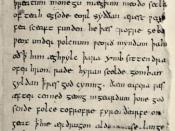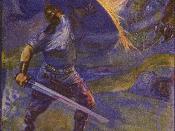An epic is best described by the Merriam-Webster Dictionary as a long narrative
poem in elevated style recounting the deeds of a legendary or historical hero. Epics like
"Beowulf" and "The Odyssey" are perfect examples of this definition; they are each
centered on the deeds and triumphs of their heroes, Beowulf and Odysseus. All epics are
similar in a way that they are made up of elements. One major element of the epic is its
themes. In all epics, the themes are what make and mold these narrative poems, they
descriptively outline the story. Most epics, like "Beowulf" and "The Odyssey", have
themes like battles, homecoming, identity, recognition etc. Through themes like these,
morals, values and traditions relating to the main characters' customs and culture can be
introduced to the reader. The setup and purpose of the story, through the theme(s), can
also be introduced.
Not only are the themes identity, battles, recognition and homecoming
related to "Beowulf" and "The Odyssey", but they are also linked to other epics as well.
"The Odyssey" is best described as "a guide to the Greeks, a guide to literature
and a guide to the complexities of society, identity, and home". There were many themes, both universal and timeless that thoroughly revealed the main ideas and issues of this legendary epic. The first and more stressed theme in "The Odyssey" is identity. "In Grecian times, the identities of human beings were associated with their properties, their name and their heritage or past". A Greeks' household was the foundation of his or her identity. Being that Odysseus was lost in search of his seized home, until he found it, he was considered a "nobody", or as he called himself, a "no-man". Like his home,


